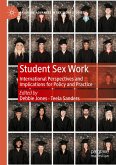This book draws on the voices of sex workers and their clients to critically assess the criminalization of prostitution in favour of decriminalization. It does so by contrasting their voices with the claims made by prohibitionists: those advocating the prohibition of prostitution or, at least, the prohibition of the purchase of sexual services, and notes scholarly research that gives context to those accounts and claims. Each chapter is dedicated to a particular issue which is given currency in academic and public debates on sex work. The first part of each chapter reviews the state of research and publicly-aired contentions and the second part compares sex workers' voices with claims from prohibitionists. It highlights the gap between what many sex workers have to say about themselves and what theorizing prohibitionists say about all prostitution. It argues that there is often a striking contrast in attitude, perspective, interpretation and valuation. This books speaks primarilyto prohibitionist thinking and sex work stereotyping and, secondarily, to the debate on decriminalization of sex work.








